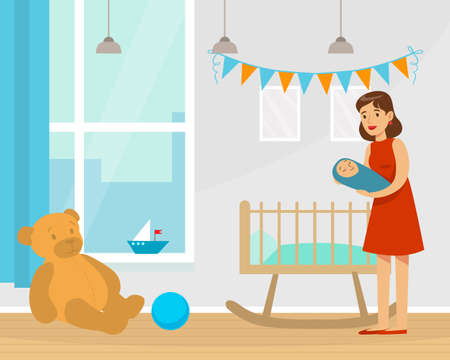Understanding Your Newborn’s Sleep Patterns in the UK
Welcoming a newborn into your family is both exciting and challenging, especially when it comes to sleep! In Britain, understanding how local factors influence your baby’s sleep can help you create nighttime routines that truly work. One of the biggest influences on newborn sleep in the UK is our ever-changing seasons. With long summer days and short winter afternoons, daylight hours vary greatly, and this can have an impact on your little one’s developing body clock. Unlike in some countries with more stable daylight, British babies may be exposed to late evening light in summer or early darkness in winter, both of which can affect when they feel ready to rest.
British home routines also play a part. Many families enjoy cosy evenings with dimmed lights and quiet activities after tea time, especially as the weather cools down. Creating calm, consistent cues at home helps signal bedtime for your newborn. For example, drawing blackout curtains even before sunset during summer months or using soft lamps in winter can help mimic a steady night environment regardless of what’s happening outside. By tuning into these seasonal and cultural rhythms, you’ll be better equipped to gently guide your newborn towards healthy sleep habits from their earliest weeks.
Creating a Cosy British Bedtime Environment
Establishing a snug and secure bedtime setting is an essential step for helping your newborn settle and sleep well in the UK. British parents often focus on creating a warm, peaceful, and safe nursery that not only keeps their little one comfortable but also follows NHS guidance for infant sleep safety. Here are some practical tips to help you design the perfect bedtime environment for your baby.
Choosing the Right Bedding
In Britain, it’s common to use cellular blankets and grobags (baby sleep bags), both highly recommended for newborns as they help regulate temperature while reducing the risk of overheating. Cellular blankets have small holes that improve airflow, while grobags ensure your baby stays covered without loose bedding in the cot.
| Bedding Option | Benefits | How to Use Safely |
|---|---|---|
| Cellular Blankets | Breathable, lightweight, easy to layer for warmth | Tuck under mattress at chest level; avoid covering baby’s head |
| Grobags (Sleep Bags) | No loose covers, consistent warmth, available in various tog ratings | Select appropriate tog (0.5–2.5) for room temperature; ensure correct size for baby’s age/weight |
NHS Guidance for Safe Sleep
- Back to Sleep: Always place your baby on their back for every sleep.
- Clear Cot: Keep the cot clear of toys, pillows, and heavy duvets.
- Room Temperature: Maintain a comfortable temperature of 16–20°C (61–68°F).
- Smoke-Free Home: Ensure your home is smoke-free as this reduces SIDS risk.
- Cot Position: Place the cot in your room for the first 6 months, close to your bed.
Tips to Enhance Cosiness and Calmness
- Soft Lighting: Use dimmable lamps or soft night lights to create a soothing atmosphere during wind-down time.
- Consistent Scents: Gentle scents like lavender can be comforting if used sparingly in a diffuser (never directly near babys cot).
- Cuddle Time: Incorporate gentle cuddles or a quiet story before bed to strengthen bonding and signal bedtime routines.
- Soothe with Sound: Soft white noise or gentle lullabies can mask household sounds and help settle your newborn.
Your British Bedtime Checklist
- Check room temperature with a thermometer.
- Select the right tog grobag or layer cellular blankets appropriately.
- Create a calming routine with dimmed lights and soothing sounds.
- Always follow NHS guidelines for safe sleeping practices.
This cosy bedtime environment tailored to British homes will give both you and your newborn peace of mind—and hopefully more restful nights together!

3. Wind-down Activities the British Way
Creating a gentle and enjoyable wind-down routine is key to helping your newborn settle for the night, especially here in Britain where traditions and comfort go hand in hand. One delightful way to start is by singing classic British lullabies—think of timeless tunes like “Twinkle, Twinkle, Little Star” or “Hush-a-Bye Baby.” Your soothing voice not only calms your baby but also strengthens that all-important parent-child bond.
Another beloved British bedtime tradition is sharing a picture book together. Choose from much-loved British authors such as Beatrix Potter or Julia Donaldson. Reading these familiar stories provides a sense of routine and security, while introducing your little one to the rich world of British storytelling. For added fun, try using different voices for each character or pointing out colourful details in the illustrations.
For some families, a gentle cuddle or a few minutes spent rocking in a cosy chair can be the perfect finishing touch to the evening. Remember, it’s less about what you do and more about creating a calm atmosphere with consistent cues that signal bedtime. These simple yet meaningful activities are not only enjoyable but help your baby feel safe and loved before drifting off to sleep.
Establishing a Consistent Nighttime Routine
Creating a predictable and soothing bedtime routine is one of the most effective ways to help your newborn settle into restful sleep, especially here in Britain where long evenings and variable seasons can affect sleep patterns. Consistency is key, as babies thrive on knowing what comes next. For British families, this often means blending practical steps with gentle, familiar cues that fit seamlessly into daily life.
Sample Bedtime Routines for British Families
| Time | Activity | Purpose |
|---|---|---|
| 6:30pm | Warm bath (perhaps with lavender-scented baby wash) | Helps relax muscles and signals winding down time |
| 6:45pm | Pajamas on & nappy change in softly lit room | Comfortable clothing and a fresh nappy set the stage for sleep |
| 7:00pm | Cuddles and a quiet lullaby or story (think classic British tales like Peter Rabbit) | Soothe baby with gentle sounds and bonding time |
| 7:15pm | Final feed (breast or bottle), lights dimmed low | Satisfies hunger and signals night-time feeding routine |
| 7:30pm | Place baby in cot awake but drowsy, soft mobile or white noise in background | Encourages self-settling while feeling secure and calm |
Bath Time Tips for Little Brits
A warm bath is often the cornerstone of a British bedtime routine—especially comforting during cooler months. Use gentle, fragrance-free products or try those infused with traditional scents like chamomile or lavender. Keep towels warm by placing them on the radiator beforehand, making the transition from bath to bed extra cosy.
Gentle Cues That Signal Sleep
- Dimming the lights: Mimics natural dusk, helping baby’s body clock adjust.
- Soft music or lullabies: Choose calming classics or even soft folk songs from your own childhood.
- A favourite comforter: A soft muslin cloth or special teddy bear can become a familiar cue over time.
The Importance of Regularity
No matter which activities you choose, keeping them in the same order each evening helps your newborn learn when it’s time for sleep. Over time, these routines become trusted signals—making bedtime smoother for both you and your little one.
5. Navigating Night Wakings and Settling Techniques
Night wakings are a normal part of newborn life, even here in Britain where every family is hoping for a peaceful night. When your baby stirs at 2am, it can feel daunting, but with some calm strategies inspired by UK health visitor advice and tried-and-tested family-friendly approaches, you’ll be better prepared to soothe your little one back to sleep.
Understanding Why Babies Wake at Night
British health visitors often remind us that newborns wake frequently due to hunger, needing comfort, or simply adjusting to their new world. Knowing this helps you respond with patience rather than frustration. Each waking is an opportunity to gently reassure your baby that they’re safe and loved.
Keep the Environment Calm and Low-Key
When your baby wakes, keep the lights dim—perhaps use a soft nightlight instead of turning on the main light. Speak in quiet whispers, and avoid stimulating play or eye contact. Many UK parents find that playing gentle white noise or lullabies (like traditional English nursery tunes) helps signal it’s still time for sleep.
Gentle Settling Techniques from British Families
Try softly shushing, patting, or rocking your baby in your arms or in their Moses basket. The “pick up, put down” method—where you pick your baby up for comfort but return them to their cot when calm—is widely recommended by British health visitors as a way to build self-settling skills over time.
Comfort Objects and Safe Sleep Practices
If your baby is a few months old, a soft muslin cloth or small comforter (approved for infant safety) can provide reassurance during night wakes. Always follow NHS safer sleep guidance: place baby on their back in a clear cot with no loose bedding or toys.
Parent Self-Care: You Matter Too!
Remember, supporting your newborn through night wakings can be exhausting. Take turns with your partner if possible, and don’t hesitate to ask grandparents or friends for help—community support is part of what makes parenting in Britain special. With patience and these gentle techniques, both you and your baby will find more restful nights ahead.
6. When to Seek Support in Britain
Even with the best nighttime routines, it’s perfectly normal for British parents to have concerns about their newborn’s sleep. If you’re feeling unsure or worried, remember you’re not alone—there’s plenty of support available throughout the UK.
How Do You Know It’s Time to Ask for Help?
If your baby is struggling to settle at night despite consistent routines, is waking very frequently, or seems unusually unsettled or distressed, it’s wise to seek guidance. Other signs might include your baby having difficulty feeding, being excessively sleepy during the day, or if you’re finding the sleep deprivation overwhelming and impacting your wellbeing.
Who Can You Turn To?
- Your Health Visitor: Every family in Britain is assigned a health visitor after birth. They’re a brilliant resource for all things related to your baby’s sleep and development. Don’t hesitate to phone your local health visiting team or mention sleep concerns during your regular check-ups—they’ve heard it all before!
- Your Local GP: For ongoing issues or if you suspect there may be an underlying medical problem affecting your baby’s sleep, book an appointment with your GP. They can help rule out conditions like reflux or allergies and offer further advice.
- Parenting Groups: Local children’s centres, NCT (National Childbirth Trust) groups, and online communities (like Mumsnet or BabyCentre UK) are great places to share experiences and gather tips from other parents who know exactly what you’re going through.
Remember: You Are Not Alone
No question is too small when it comes to your baby’s wellbeing. The British parenting community values openness and mutual support—reaching out shows strength and helps ensure both you and your little one get the rest you need.


